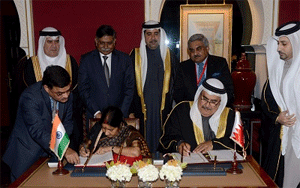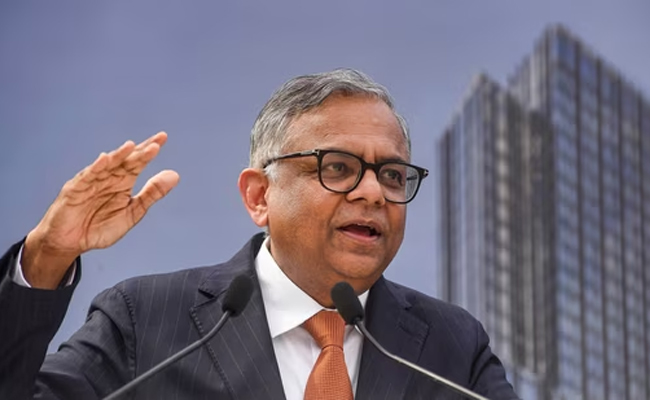New Delhi, July 15 : In an important boost to the Indian healthcare industry, India and Bahrain on Sunday agreed to make pharmaceuticals a key area of cooperation following the second High Joint Commission meeting led by External Affairs Minister Susham Swaraj and Bahraini Foreign Minister Shaikh Khalid Bin Ahmed Bin Mohamed Al Khalifa in Manama.
"Bahrain and India agreed to explore opportunities healthcare industry and welcomed the signing of an MoU for cooperation in the field of healthcare, which would contribute in expanding the cooperation between the two countries making pharmaceuticals a key priority area in the bilateral relations," said a joint statement issued following the meeting.
The two sides also signed an MoU on renewable energy even as Bahrain congratulated Sushma Swaraj on launching of the International Solar Alliance (ISA) by Prime Minister Narendra Modi.
Launched by Modi and then French President Francois Hollande at the Paris climate summit in 2015, the ISA was conceived as a coalition of solar resource-rich countries to address their special energy needs and provide a platform to collaborate on dealing with the identified gaps through a common, agreed approach.
India and Bahrain also noted the existing potential for two-way investments and reaffirmed their desire to provide favourable environment for investments, both from public and private sectors, from the two countries, the statement said.
"Both sides agreed on the importance of regular and timely exchange of information on available investment opportunities," it said.
It said that both sides discussed in detail various aspects of bilateral relations including "ways and means to expand cooperation in the fields of education, health, housing, renewable energy, space cooperation, tourism, culture, youth and sports, women empowerment, customs, oil and gas and petrochemicals; security, defence and intelligence training and exchange of expertise, cooperation between universities in both countries and the possible exchange of researchers and faculty members in the fields of food security, cyber space and energy".
Both the countries also reiterated their condemnation of terrorism in all its forms and manifestations and called all states to reject and abandon the use of terrorism against other countries.
"The two sides agreed to work together for the early adoption of India's proposed Comprehensive Convention on International Terrorism at the United Nations," the statement said.
During the meeting, Bahrain Foreign Minister Shaikh Khalifa lauded the role of the Indian expatriate community's role in his country's development.
"FM Shaikh Khalifa praised the contribution of Indian community settled in Bahrain towards the economic development of Bahrain," External Affairs Ministry spokesperson Raveesh Kumar tweeted.
Bahrain is home to around 350,000 Indian nationals, the largest expatriate community in the Gulf Kingdom, and more than 3,000 Indian-owned or joint venture companies.
Bilateral trade between India and Bahrain stood at over $875 million as of February this year, according to figures provided by the External Affairs Ministry.
India's total capital investment into Bahrain between January 2003 and March 2018 has been estimated at $1.69 billion.
On Saturday, the first day of her two-day visit to Bahrain, Sushma Swaraj, along with Shaikh Khalifa, inaugurated the new Indian Embassy complex in Manama.
"The new developments that have taken place in the economic field in the two countries, will take economic relations to greater heights," she said in her address at the ceremony.
Let the Truth be known. If you read VB and like VB, please be a VB Supporter and Help us deliver the Truth to one and all.
Kozhikode (Kerala) (PTI): The DRI on Tuesday said it has seized about Rs 70 crore worth drugs in Kerala so far in this financial year, and effected 21 arrests.
In the latest seizure, nearly two kg of crystal methamphetamine was recovered from a passenger at the International Airport here as part of its continued crackdown on narcotics trafficking in the state, DRI said.
In a statement, the Directorate of Revenue Intelligence said a man hailing from Palakkad was intercepted after he arrived from Muscat on Monday.
"Acting on specific intelligence, officers of the Calicut Regional Unit of the Directorate of Revenue Intelligence (DRI), Cochin Zonal Unit, intercepted a passenger and recovered two packets containing Crystal Methamphetamine, weighing a total of 1,931 grams," the agency said.
Officials said the drugs were cleverly hidden inside food packets kept in the passenger's checked-in baggage.
"The seized narcotic substance, valued at approximately Rs 3.86 crore in the illicit international market, was ingeniously concealed inside food packets placed in the passenger's checked-in baggage," the statement said.
The passenger has been arrested under the provisions of the Narcotic Drugs and Psychotropic Substances (NDPS) Act, 1985.
"Further investigation is in progress to ascertain the source of the narcotics and to identify other individuals and networks involved in this smuggling operation," the DRI added.
The agency said the latest seizure is part of its sustained efforts against drug trafficking in the state.
"In this financial year, the Directorate of Revenue Intelligence, Cochin Zonal Unit, has seized narcotic drugs and psychotropic substances (NDPS), including hydroponic weed, methamphetamine and cocaine, valued at Rs 70.76 crore in Kerala. In connection with these seizures, 21 individuals have been arrested," it said.





